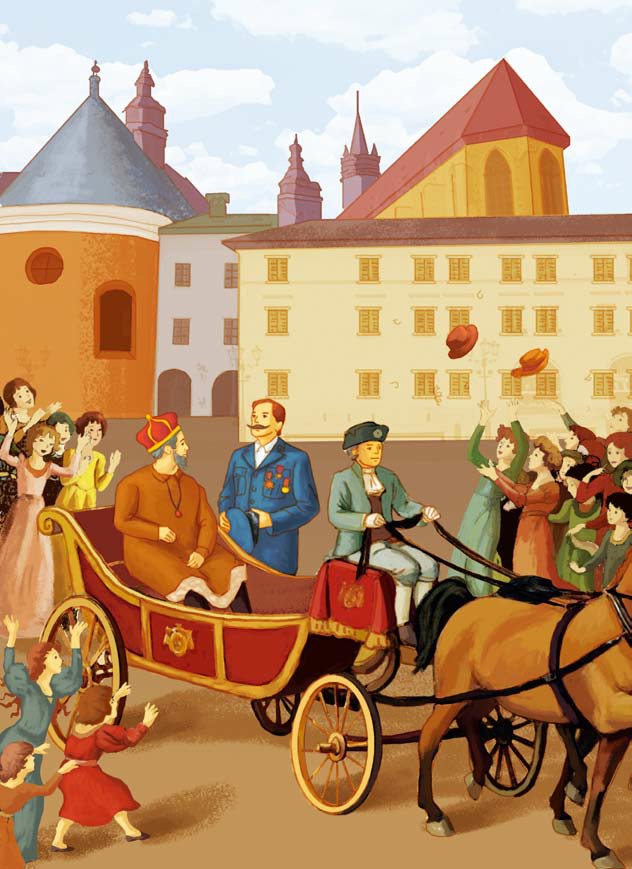KING UMBERTO.
溫塔爾脫王
Monday, 3d.
周一,三日
At ten o'clock precisely my father saw from the window Coretti, the wood-seller, and his son waiting for me in the square, and said to me:--
十點(diǎn)鐘的時(shí)候,父親見(jiàn)柴店里的父子已在四角路口等我了,和我說(shuō):
"There they are, Enrico; go and see your king."
“他們已經(jīng)來(lái)了。安利柯!快迎接國(guó)王去!”
I went like a flash. Both father and son were even more alert than usual, and they never seemed to me to resemble each other so strongly as this morning. The father wore on his jacket the medal for valor between two commemorative medals, and his mustaches were curled and as pointed as two pins.
我飛奔過(guò)去。可萊諦父子比往日更高興,我從沒(méi)有見(jiàn)過(guò)他們父子像今天這般相像。那父親的上衣上掛著兩個(gè)紀(jì)念章和一個(gè)勛章,須卷得很整齊,須的兩端尖得同針一樣。
We at once set out for the railway station, where the king was to arrive at half-past ten. Coretti, the father, smoked his pipe and rubbed his hands. "Do you know," said he, "I have not seen him since the war of 'sixty-six? A trifle of fifteen years and six months. First, three years in France, and then at Mondov? and here, where I might have seen him, I have never had the good luck of being in the city when he came. Such a combination of circumstances!"
國(guó)王定十點(diǎn)半到,我們就到車(chē)站去。可萊諦的父親吸著煙,搓著手說(shuō):“我從那六十六年的戰(zhàn)爭(zhēng)以后,還未曾見(jiàn)過(guò)陛下呢!已經(jīng)十五年又六個(gè)月了。他先三年在法蘭西,其次是在蒙脫維,然后回到意大利。我運(yùn)氣不好,每次他駕臨市內(nèi),我都不在這里。”
He called the King "Umberto," like a comrade. Umberto commanded the 16th division; Umberto was twenty-two years and so many days old; Umberto mounted a horse thus and so.
他把溫培爾脫王當(dāng)做朋友稱(chēng)呼,叫他“溫培爾脫君”,不住地說(shuō):“溫培爾脫君是十六師師長(zhǎng)。溫培爾脫君那時(shí)不過(guò)二十二歲光景。溫培爾脫君總是這樣騎著馬。”
"Fifteen years!" he said vehemently, accelerating his pace. "I really have a great desire to see him again. I left him a prince; I see him once more, a king. And I, too, have changed. From a soldier I have become a hawker of wood." And he laughed.
“十五年了呢!”柴店主人跨著步大聲說(shuō)。“我誠(chéng)心想再見(jiàn)見(jiàn)他。還是在他做親王的時(shí)候見(jiàn)過(guò)他,一直到現(xiàn)在了。今番見(jiàn)他,他已經(jīng)做了國(guó)王了。而且,我也變了,由軍人變?yōu)椴竦曛魅肆恕!闭f(shuō)著自己笑了。

His son asked him, "If he were to see you, would he remember you?"
“國(guó)王看見(jiàn)了,還認(rèn)識(shí)父親嗎?”兒子問(wèn)。
He began to laugh."You are crazy!" he answered. "That's quite another thing. He, Umberto, was one single man; we were as numerous as flies. And then, he never looked at us one by one."
父親笑著說(shuō):“你太不知道了!那可未必。溫培爾脫君只是一個(gè)人,這里不是像螞蟻一樣地大家擠著嗎?并且他也不能一個(gè)一個(gè)地看見(jiàn)我們呀。”
We turned into the Corso Vittorio Emanuele; there were many people on their way to the station. A company of Alpine soldiers passed with their trumpets. Two armed policemen passed by on horseback at a gallop. The day was serene and brilliant.
車(chē)站附近的街路上已是人山人海,一隊(duì)兵士吹著喇叭通過(guò)。兩個(gè)警察騎著馬走過(guò)。天晴著,光明充滿(mǎn)了大地。











